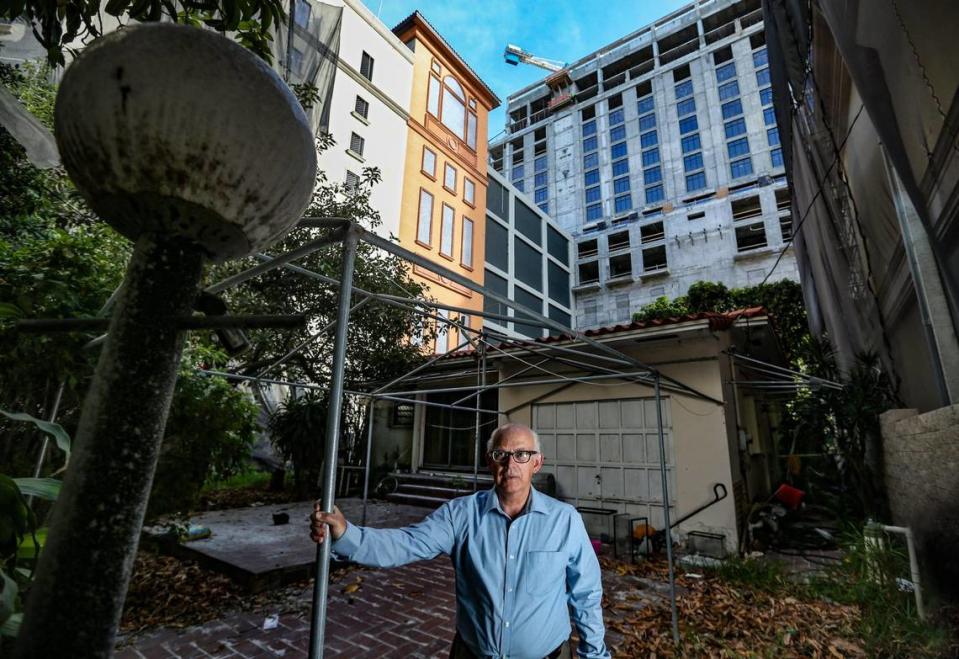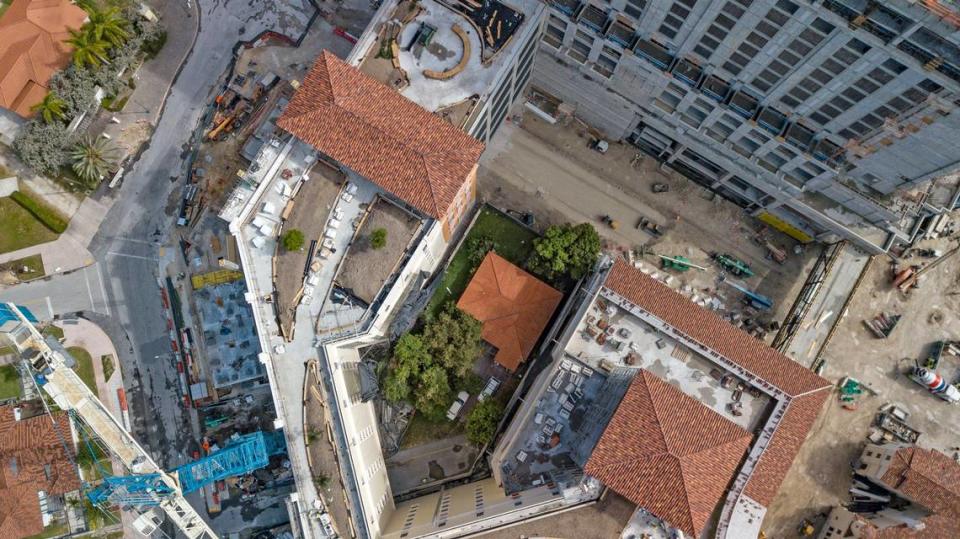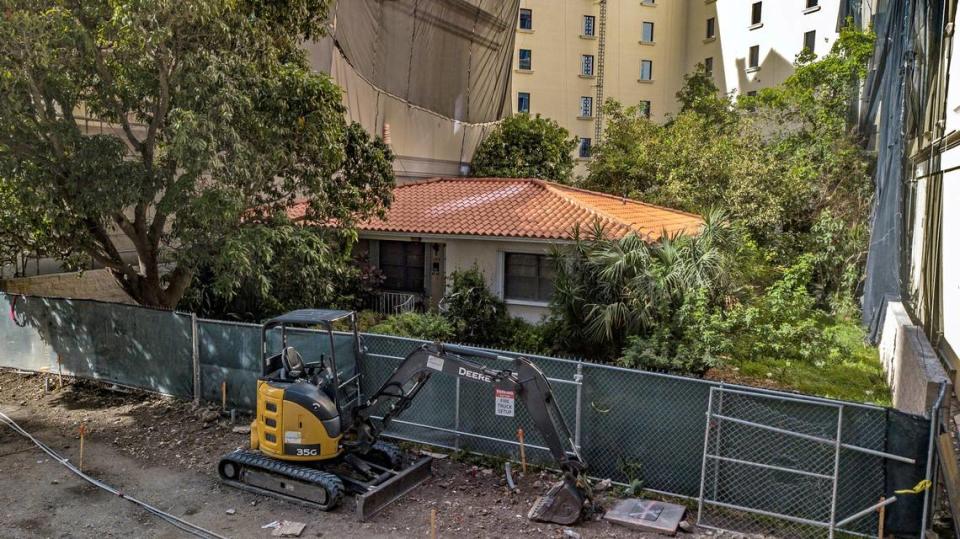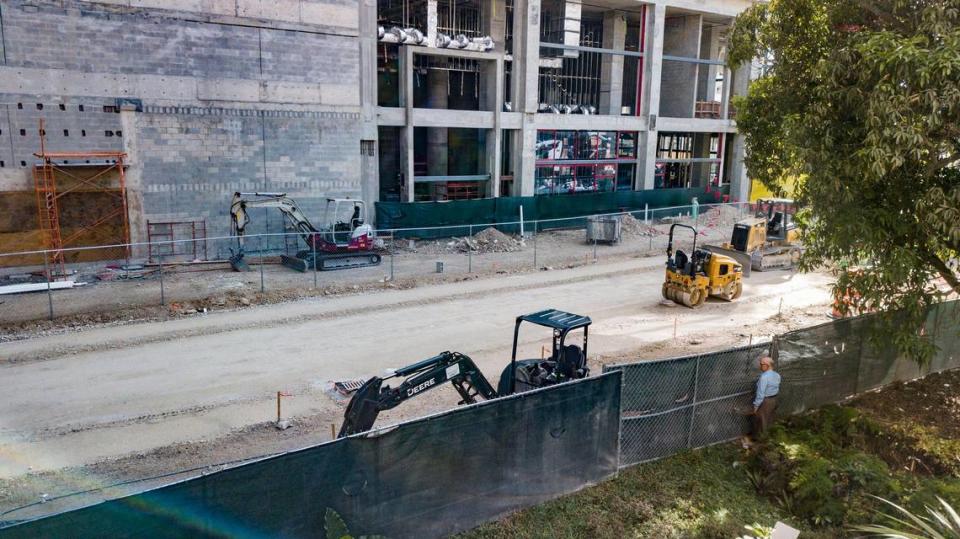Still standing, still occupied: Little house swallowed by Gables mega development
For six years, Orlando Capote has been tilting at windmills — and backhoes — by refusing to move out of his little house as it has been engulfed by the most mega commercial development in Coral Gables history.
He lives in the middle of a construction zone, surrounded on all sides by parking garages and a 15-story hotel that dwarf his cozy two-bedroom home. The arms of three giant cranes swing over his barrel-tile roof, and he prays they won’t drop their payload on his head. Noisy trucks rumble by his front door, and the racket of drilling and hammering and sawing fills his dining room.
His mango and avocado trees are covered in dust, and his yard, a green island, is strewn with stray pieces of metal, glass and wood and littered with paper plates and cups — the lunch detritus of workers laboring 200 feet above him.
Capote is determined to stay in the dream house his Cuban immigrant parents bought for $135,000 in 1989. Unlike his neighbors, whose houses were demolished after they took buyout offers and fled, Capote remains at 2915 Coconut Grove Drive on the principle that somebody has to stand up to Goliath real estate developers and resist a government that is allowing huge projects to devour the City Beautiful.
But now Capote lives alone. He is fighting Coral Gables alone. Hemmed in at the bottom of a canyon of concrete, he’s lost his chief ally in the crusade to save the house. His mother, Lucia, 94, fell in the kitchen in November, broke her leg and died at a rehabilitation facility on Feb. 26.

Capote dreaded such an emergency and since 2015 has filed two dozen complaints about zoning and fire code violations, including inadequate access to his house in case firefighters or paramedics needed to respond.
Time after time, Capote argued, Coral Gables bent over backward to expedite the developer’s construction plans, sacrificing a neighborhood in the process.
“The city violated its own laws to accommodate a developer instead of protecting the rights of homeowners,” he said. “This area was single-family residential and now it’s massive monsters.”
The Plaza Coral Gables is a $600 million mixed-used mini city being built by Mexican developer Agave Holdings, an affiliate of the Jose Cuervo tequila company. The 7-acre project along the north side of Ponce de Leon Boulevard seven blocks south of Miracle Mile will encompass 1.1 million square feet of luxury apartments, offices, shops, restaurants, parking garages and a 242-room hotel when it is finished in late 2022.
Capote’s front yard faces the hotel.
“I’m going to sunbathe naked so everyone can laugh at me,” Capote said. “As you can see, this is a concrete jungle. High walls abutting the sidewalks. To call it ‘plaza’ is just a gimmick.”

Capote objected to the closure of the alley that ran behind his house off Galiano Street, arguing it violated county and state law because it did not serve a public purpose, only the needs of contractors. The city denied his appeal and closed it, overriding the jurisdiction of the county. Now the alley is a cul-de-sac that dead ends at the wall of a 100-foot tall parking garage. The six Porta-Potties that used to sit by Capote’s garden patio have been replaced by an electrical transformer for the building. There’s also a pile of rubble, rebar, pallets and hoses.
Capote objected to the closure of Coconut Grove Drive, arguing that closing a public street to turn it into a construction site for five years was improper and presented a safety hazard.
But the city allowed the developer to install a maze of chain-link fencing and locked gates at the end of Capote’s block in 2017. In the front yard of his house, he is essentially trapped in by a 6-foot-tall fence and a padlocked gate. The city assured Capote that emergency vehicles had a “clear path” of access to his house either from the gates — opened by fire and police officers with special master keys — or from the back alley. The city said the locked gates were not an obstruction but “a minor inconvenience.”
Capote appealed the closures and lost. He summed up the city’s attitude: “It’s my fault for staying. Blame the victim.”
The city of Coral Gables maintains that no laws have been broken and the fire code has not been violated.
“The issues raised have been extensively reviewed and investigated,” said city spokesperson Martha Pantin, adding that the county has certified the project as in compliance with the county code. “Unfortunately, by choosing to remain in the property despite the development, he should have understood what that would mean and the inconveniences that it could result in.”
When his mother fell and he called 911, he told the operator a backhoe was blocking the front entrance of the house. Paramedics drove in through the alley but their gurney wouldn’t fit through the back door. So they parked their ambulance on Coconut Grove Drive and had to wheel Capote’s mother 200 feet down the street, he said.
Listen to today's top stories from the Miami Herald:
Subscribe: Apple Podcasts | Spotify | Amazon Alexa | Google Assistant | More options
“Clear access? There is no clear access to my home, unless it’s for construction equipment,” said Capote, whose mailbox was moved to the end of his back driveway because mail carriers can’t get to his front door. He speaks through a respirator mask he wears to filter the fumes and dust because he has coughing fits. He wears earplugs to blunt the din.
Yet Capote won’t leave. He can’t leave. The house is brimming with memories of his parents. He was their caretaker. His father, Orlando Sr., an electrical inspector, died at age 80 in 2005.
“I see my mother sitting on the front porch or playing the piano or bringing a glass of water to my father as he worked in the yard,” he said. “I stay for sentimental reasons — the memories will live as long as I live here. And there are financial reasons. We survived the 2008 crisis in this house and I’ve survived the pandemic crisis with a roof over my head. The alternatives could have been much worse.
“As bad as it may look, I try not to see the towers, and I think this is the best place for me.”

Capote, a county-employed electrical engineer, and his mother, a school teacher, refused to sell to the developer, real estate agents or flippers who made 35 offers of up to $900,000 for the 1,300-square-foot house his parents purchased years after they lost their home in Cuba following Fidel Castro’s revolution and moved to Miami.
“This house was our American dream,” Capote said.
Their neighbors sold for amounts ranging from $500,000 to $1.2 million, Capote said. His mother was pressured by anonymous callers who said she’d die and rot entombed inside the house and nobody would find her, but that only made her more resolute.
“We worked hard to get the money to buy this house,” Lucia said in an interview two years ago, as tears welled in her and her son’s eyes. “I don’t want to lose it, just like I lost my husband.”
At one point, the developer offered to move the Capotes into a new house nearby, but Capote’s mother called it “the house of lies” because of its flaws. Agave Holdings then said it decided to “design accordingly” around the Capotes’ house.
“Given what happened to this neighborhood, how it disappeared before our eyes, we felt we couldn’t trust any offer, most smelled like scams,” Capote said.

There’s no turning back now. Capote fought on behalf of his mother to stop, stall or shrink the project. He’s been consumed by researching city codes, county regulations and state law. He’s attended meetings, pulled documents and sent emails to zoning, building, traffic engineering and fire rescue officials. He can quote word for word and by statute number the rules on easements, alleys, setbacks, height restrictions, platting, SAPs (Special Area Plans) — all manipulated, he says, in favor of the developer. Defiant, he cites “small victories,” and recently filed another complaint about an excavator blocking the street.
Capote blames Coral Gables for allowing expansion of the Plaza complex to four times its original size through variances that increased retail space to nearly the same square footage of all Miracle Mile’s businesses combined. Booming growth and residents’ criticism of overdevelopment was the key issue in the city’s recent mayoral and commission elections and has inspired protests at City Hall.
Capote’s house is symbolic as a holdout.
“Here you have a perfect example of how the property rights of the people, by the people and for the people were superseded by government leaders willing to put a powerful developer first,” he said. “I still believe you can beat city hall if city hall plays fair. We’re supposed to live in a country of laws and rules. Otherwise we’re going to turn into Venezuela.”
Maybe someday there will be a plaque by Capote’s front door, read by office tower employees, hotel guests, apartment dwellers and shoppers curious about the little house and its mango tree embedded in The Plaza Coral Gables — engraved with the words: “He stayed. Home sweet home.”
“It’s been disappointing, but I have not given up hope,” Capote said. “I did what I believed was right. It didn’t work out as it should have. But I am still living in my family’s house and I will never leave.”


 Yahoo Finance
Yahoo Finance 